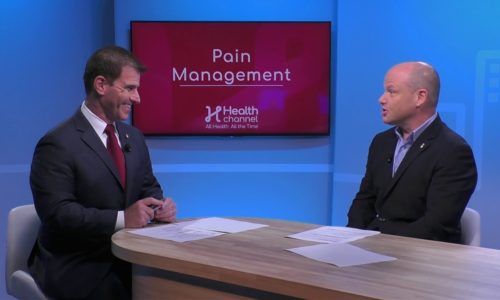Herniated Disk |
Degenerative disc disease is something that will happen as people age. The discs star desiccating, losing some water content and start standing down. All of these processes are developing into arthritis of the neck.
Jose Mena, Interventional Spine Specialist at Miami Orthopedics & Sports Medicine Institute, also describes how herniated disc occurs and how it affects a person’s health.
Transcript
There’s something called osteoarthritis — mm-hmm — can you use it your fake neck yeah and kind of tell us what it is doctor. It’s sometimes called degenerative disc disease. > Okay that’s basically we have dented my neck all right yeah so we have the disc over here — don’t go too much — all right so we have the disc, we have the bones, so the degenerative disc disease is something that will happen as we age the discs they start desiccating they start losing some water content so what they do is that they start standing down. When they start singing down that that’s what I was the principal that I was talking before when it starts taking now remember that the dis where bears 80% of the load of the spine so then the rest that know that is being diminished instead of being now 80 let’s say 60 so that extra 20% is gonna be distributed to a pair of joints that we have here in the back, which are the facet joints, okay? So we have one on the right and one on the left, so they can become arthritic and that’s what we call arthritis of the neck. > All right and another neck problem can be caused by a herniated disc — herniated disc — we hear that a lot. I actually think we have a picture of one let’s see if we can take that real quick and tell us what we’re looking at there Dr. > All right, so what you’re looking there is the neck if I slice someone in half and I’m looking them front to from up to down I see it will say you the front and the back and then we have the nerves, so the the jello… I mean the jelly that we have in between that is blue that’s the center of the disc so it’s escaping through a rent or fissure there and it’s touching there the yellow structure which is the nerve and that can become painful. So typically what happens as we age I was talking that this degenerates there start losing some water content so the disc becomes more weaker so any position that you do that you increase the intra disco pressure even like coughing or sneezing or straining that can cause this to slip out and touch that nerve, and that’s when people they have this stiffness sometimes all of a sudden a stiff neck and they can have even symptoms going on down the arm. > Is this when you perform a disco gram? > A disco gram is different it’s a it’s a procedure that we use for diagnostic purposes and it’s mainly wandering we have multiple levels that are they’re degenerated that we want to look which level is causing their pain so a surgeon can either do a cervical disc replacement or a fusion. So it’s just a more that we have multiple levels that they look dark and we go ahead on their x-ray guidance and we put a needle like that inside the disc and we put a dye or contrast to highlight the disc I look at the morphology and see whether that disc is paying for or not.








